How John Wesley Relates to
the
Heresy of
Decisional Regeneration
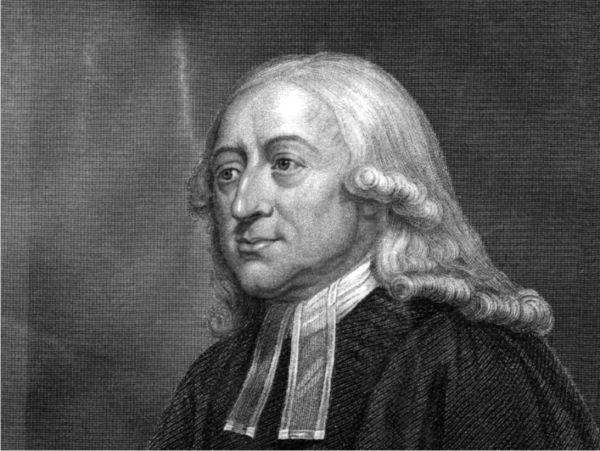
John Wesley on Christian perfection
John Wesley has been maligned for claiming that Christians can, through cooperation with the Holy Spirit, become sinless. This is a straw man claim that John Wesley never made. As you read his words, you will realize he is saying it is possible for saints to completely yield, on a continuous basis, to the indwelling Holy Spirit. This is similar to what Saint Augustine wrote in his refutation of Pelagius:
“Man's righteousness must be attributed to the operation of God, although not taking place without man's will; and we therefore cannot deny that his perfection is possible even in this life, because all things are possible with God, - both those which He accomplishes of His own sole will, and those which He appoints to be done with the cooperation with Himself of His creature's will. Accordingly, whatever of such things He does not effect is no doubt without an example in the way of accomplished facts, although with God it possesses both in His power the cause of its possibility, and in His wisdom the reason of its unreality”
“We, however, on our side affirm that the human will is so divinely aided in the pursuit of righteousness, that (in addition to man's being created with a free-will, and in addition to the teaching by which he is instructed how he ought to live) he receives the Holy Ghost, by whom there is formed in his mind a delight in, and a love of, that supreme and unchangeable good which is God, even now while he is still "walking by faith" and not yet "by sight;" in order that by this gift to him of the earnest, as it were, of the free gift, he may conceive an ardent desire to cleave to his Maker, and may burn to enter upon the participation in that true light, that it may go well with him from Him to whom he owes his existence. A man's free-will, indeed, avails for nothing except to sin, if he knows not the way of truth; and even after his duty and his proper aim shall begin to become known to him, unless he also take delight in and feel a love for it, he neither does his duty, nor sets about it, nor lives rightly. Now, in order that such a course may engage our affections, God's "love is shed abroad in our hearts," not through the free-will which arises from ourselves, but "through the Holy Ghost, which is given to us."
Back to the straw man controversy with Wesley:
This places the controversy not in realm of the possibility of sinlessness, but in the realm of whether or not the Holy Spirit immediately helps saints. Many Protestants, who have accepted the Scottish Common Sense Realism view of salvation, do not believe the Holy Spirit helps saints apart from the limits of the “verbal restrictive” theory. This, would of course, limit man’s sanctification to the limits of man’s rational mind. This is the REAL reason many ministers objected to Wesley’s entire sanctification theory. Most of these ministers were Calvinists that believed the Scottish Common Sense Realism view of salvation, so they could not agree with Wesley or Saint Augustine or Calvin that the Holy Spirit helps saints immediately.
Put simply, the Scottish Common Sense Realism view of salvation is limited to man’s rational mind being changed by believing Scripture. As such, entire sanctification is axiomatically impossible within that salvation paradigm.
The following is from A Plain Account of Christian Perfection by John Wesley
In this I endeavoured to show,
(1.) In what sense Christians are not,
(2.) In what sense they are, perfect.
"(1.) In what sense they are not. They are not perfect in knowledge. They are not free from ignorance, no, nor from mistake. We are no more to expect any living man to be infallible, than to be omniscient. They are not free from infirmities, such as weakness or slowness of understanding, irregular quickness or heaviness of imagination. Such in another kind are impropriety of language, ungracefulness of pronunciation; to which one- might add a thousand nameless defects, either in conversation or behaviour. From such infirmities as these none are perfectly freed till their spirits return to God; neither can we expect till then to be wholly freed from temptation; for 'the servant is not above his master.' But neither in this sense is there any absolute perfection on earth. There is no perfection of degrees, none which does not admit of a continual increase.
"(2.) In what sense then are they perfect? Observe, we are not now speaking of babes in Christ, but adult Christians.
There is indeed an instantaneous, as well as a gradual, work of God in his children; and (everyone knows many) who have received, in one moment, either a clear sense of the forgiveness of their sins, or the abiding witness of the Holy Spirit. But we do not know a single instance, in any place, of a person's receiving, in one and the same moment (a clear sense of), remission of sins, the abiding witness of the Spirit, and a new, a clean heart.
Note: Wesley means “we do not know a single instance, in any place, of a person's EXPERIENCING THOUGHTS AND FEELINGS OF receiving, in one and the same moment, remission of sins, the abiding witness of the Spirit, and a new, a clean heart”. Wesley means that people who are saved, experience in order, first, thoughts and feelings of remission of sins when they truly repent (at the end of a long or short period of “law works”), second, thoughts and feelings that are evidence of the abiding witness of the Spirit, and third, thoughts and feelings that are evidence of a new, and clean heart. Wesley knows that sanctification and the indwelling of the Holy Spirit is instantaneous, it is only the experience of thoughts and feelings that come in order, and not consciously experienced instantaneously.
Wesley does not question that all three phenomenon, 1) remission of sins, 2) the abiding witness of the Spirit, and 3) a new, a clean heart” are of, by and through the Holy Spirit. When we return to Wesley’s words, we will hear him say, “ In their trouble they cry unto the Lord, and he shows them, that he hath taken away their sins, and opens the kingdom of heaven in their hearts, righteousness, and peace, and joy in the Holy Ghost”.
The distinction between God’s work and man’s thoughts and feelings is what causes so much confusion. The imputation of holiness by God is instantaneous and complete. Saints are just as much saints at the moment of their regeneration as the day of their death after years of progressive sanctification. A saint is holy by God’s gift, not man’s efforts. Nevertheless, we are to “work out your own salvation with fear and trembling” (Philippians 2:12). “Working out” does not imply “yet to be made”. It refers to using what one possesses already as a gift of God, (a regenerate heart and the help of the indwelling Holy Spirit), as Paul completes the thought: “For it is God which worketh in you both to will and to do of his good pleasure” (Philippians 2:13).
The word translated Saint is the Greek word “hagios”, which just means “holy”. The Greek word is “hagios” is used 219 times in the New Testament. In 62 of those 219 times, hagios is translated “saint” or “saints”. In all 219 places, holy always is of, by and through the activity of the Holy Spirit. Saints are saints immediately by the work of the Holy Spirit.
“Not by works of righteousness which we have done, but according to his mercy he saved us, by the washing of regeneration, and renewing of the Holy Ghost” (Titus 3:1).
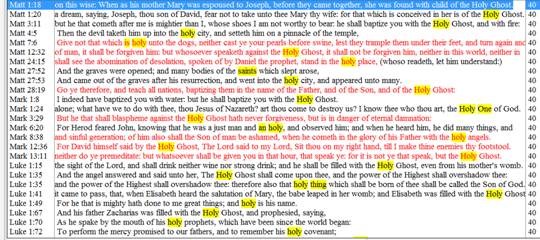
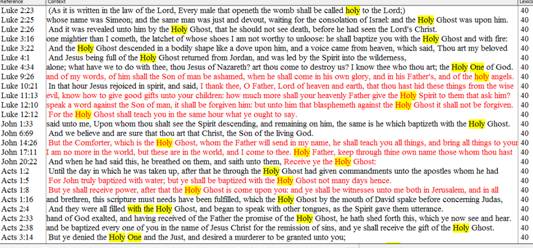
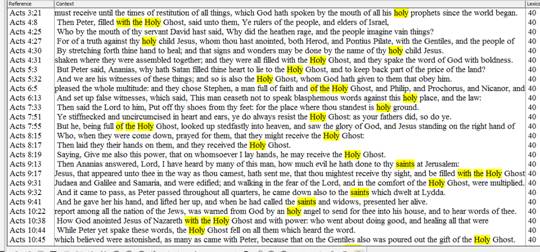
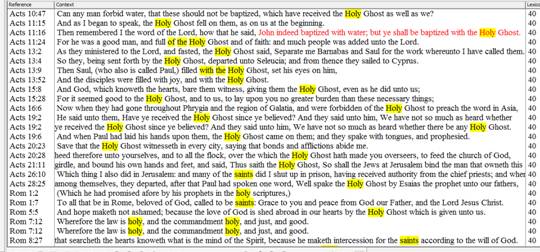
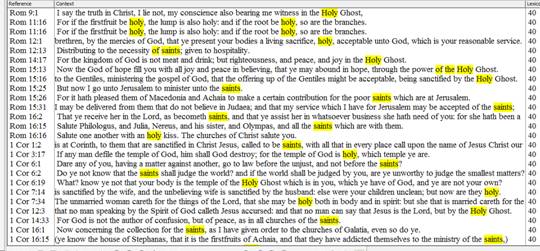
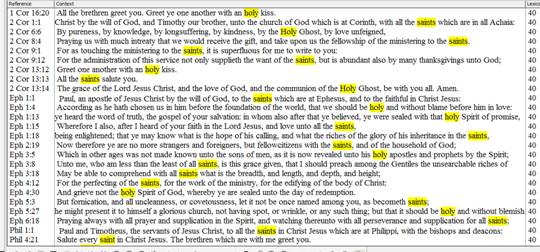
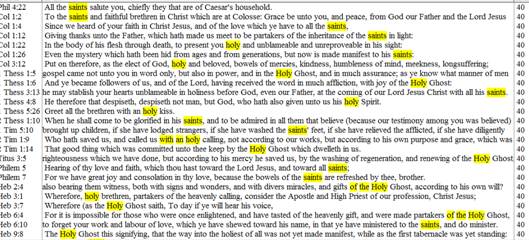
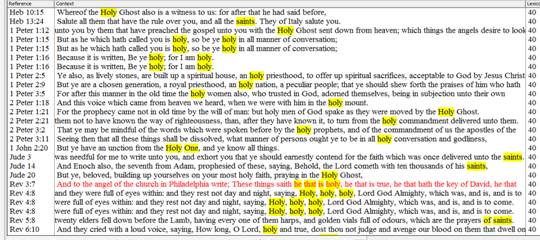
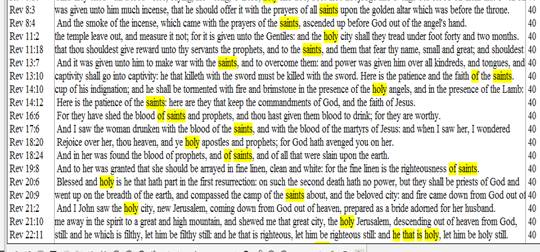
The word translated “sanctified” in the King James Version is “hagiazo”, which means “to make hagios”, or in the English, “to make holy”. In all 28 places, sanctified always is of, by and through the activity of the Holy Spirit.
“For both he that sanctifieth and they who are sanctified are all of one: for which cause he is not ashamed to call them brethren” (Hebrews 2:11).
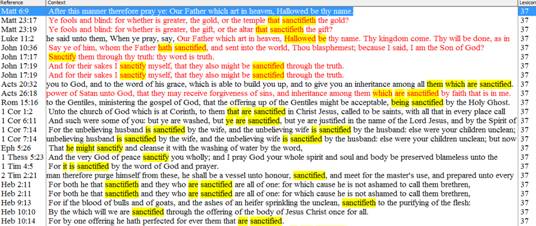
![]()
The word translated “sanctification” in the King James Version is “hagiasmos”, which means “the state of being hagios”, or in the English, “the state of being holy”. In all 10 places, sanctification always is of, by and through the activity of the Holy Spirit.
“Elect according to the foreknowledge of God the Father, through sanctification of the Spirit, unto obedience and sprinkling of the blood of Jesus Christ” (1 Peter 1:2).

Resuming John Wesley’s A Plain Account of Christian Perfection
"Indeed, how God may work, we cannot tell; but the general manner wherein he does work is this: Those who once trusted in themselves that they were righteous, that they were rich, and increased in goods, and had need of nothing, are, by the Spirit of God applying his word, convinced that they are poor and naked. All the things that they have done are brought to their remembrance and set in array before them, so that they see the wrath of God hanging over their heads, and feel that they deserve the damnation of hell.
In their trouble they cry unto the Lord, and he shows them. that he hath taken away their sins, and opens the kingdom of heaven in their hearts, righteousness, and peace, and joy in the Holy Ghost.' Sorrow and pain are fled away, and sin has no more dominion over' them. Knowing they are justified freely through faith in his blood, they have peace with God through Jesus Christ;' they 'rejoice in hope of the glory of God,' and 'the love of God is shed abroad in their hearts.'
"In this peace they remain for days, or weeks, or months, and commonly suppose they shall not know war any more; till some of their old enemies, their bosom sins, or the sin which did most easily beset them, (perhaps anger or desire,) assault them again, and thrust sore at them, that they may fall. Then arises fear, that they shall not endure to the end; and often doubt, whether God has not forgotten them, or whether they did not deceive themselves in thinking their sins were forgiven.
Under these clouds, especially if they reason with the devil, they go mourning all the day long. But it is seldom long before their Lord answers for himself, sending them the Holy Ghost to comfort them, to bear witness continually with their spirits that they are' the children of God. Then they are indeed meek and gentle and teachable, even as a little child. And now first do they see the ground of their heart; which God before would not disclose unto them, lest the soul should fail before him, and the spirit which he had made. Now they see all the hidden abominations there, the depths of pride, self-will, and hell; yet leaving the witness in themselves, 'Thou art an heir of God, a joint heir with Christ, even in the midst of this fiery trial;' which continually heightens both the strong sense they then have of their inability to help themselves, and the inexpressible hunger they feel after a full renewal in his image, in 'righteousness and true holiness.'
Then God is mindful of the desire of them that fear him, and gives them a single eye, and a pure heart; he stamps upon them his own image and superscription; He createth them anew in Christ Jesus; he cometh unto them with his Son and blessed Spirit, and, fixing his abode in their souls, bringeth them into the 'rest which remaineth for the people of God.'"
Lord, I believe a rest remains, To all thy people known; A rest where pure enjoyment reigns, And thou art loved alone; A rest where all our soul's desire Is fix'd on things above; Where doubt and pain and fear expire, Cast out by perfect love. From every evil motion freed, (The Son hath made us free,) On all the powers of hell we tread, In glorious liberty. Safe in the way of life, above Death, earth, and hell we rise; We find, when perfected in love, Our long-sought paradise. O that I now the rest might know, Believe, and enter in! Now, Saviour, now the power bestow, And let me cease from sin!
Remove this hardness from my heart, This unbelief remove: To me the rest of faith impart, The sabbath of thy love. Come, O my Saviour, come away Into my soul descend! No longer from thy creature stay, My author and my end. The bliss thou hast for me prepared, No longer be delay'd: Come, my exceeding great reward, For whom I first was made. Come, Father, Son, and Holy Ghost, And seal me thine abode! Let all I am in thee be lost: Let all be lost in God!
Can anything be more clear, than,
(1.) That here also is as full and high a salvation as we have ever spoken of?
(2.) That this is spoken of as receivable by mere faith, and as hindered only by unbelief? (3.) That this faith, and consequently the salvation which it brings, is spoken of as given in an instant?
(4.) That it is supposed that instant may be now? that we need not stay another moment? that "now," the very "now, is the accepted time? now is the day of" this full "salvation?" And, Lastly, that, if any speak otherwise, he is the person that brings new doctrine among us?
"(1.) Perhaps the general prejudice against Christian perfection may chiefly arise from a misapprehension of the nature of it. We willingly allow, and continually declare, there is no such perfection in this life, as implies either a dispensation from doing good, and attending all the ordinances of God, or a freedom from ignorance, mistake, temptation, and a thousand infirmities necessarily connected with flesh and blood.
"(2.) First. We not only allow, but earnestly contend, that there is no perfection in this life, which implies any dispensation from attending all the ordinances of God, or from doing good unto all men while we have time, though 'especially unto the household of faith.' We believe, that not only the babes in Christ, who have newly found redemption in his blood, but those also who are 'grown up into perfect men,' are indispensably obliged, as often as they have opportunity, 'to eat bread and drink wine in remembrance of Him,' and to 'search the Scriptures;' by fasting, as well as temperance, to 'keep their bodies under, and bring them into subjection;' and, above all, to pour out their souls in prayer, both secretly, and in the great congregation.
"(3.) We Secondly believe, that there is no such perfection in this life, as implies an entire deliverance, either from ignorance, or mistake, in things not essential to salvation, or from manifold temptations, or from numberless infirmities, wherewith the corruptible body more or less presses down the soul. We cannot find any ground in Scripture to suppose, that any inhabitant of a house of clay is wholly exempt either from bodily infirmities, or from ignorance of many things; or to imagine any is incapable of mistake, or falling into divers temptations.
"(4.) But whom then do you mean by 'one that is perfect?' We mean one in whom is 'the mind which was in Christ,' and who so 'walketh as Christ also walked;' a man 'that hath clean hands and a pure heart,' or that is 'cleansed from all filthiness of flesh and spirit;' one in whom is 'no occasion of stumbling,' and who, accordingly, 'does not commit sin.' To declare this a little more particularly: We understand by that scriptural expression, 'a perfect man,' one in whom God hath fulfilled his faithful word, 'From all your filthiness and from all your idols I will cleanse you: I will also save you from all your uncleannesses.' We understand hereby, one whom God lath 'sanctified throughout in body, soul, and spirit;' one who 'walketh in the light as He is in the light, in whom is no darkness at all; the blood of Jesus Christ his Son having cleansed him from all sin.'
"(5.) This man can now testify to all mankind, 'I am crucified with Christ: Nevertheless I live; yet not I, but Christ liveth in me.' He is 'holy as God who called' him 'is holy,' both in heart and 'in all manner of conversation.' He 'loveth the Lord his God with all his heart,' and serveth him 'with all his strength.' He 'loveth his neighbour,' every man, 'as himself;' yea, 'as Christ loveth us;' them, in particular, that 'despitefully use him and persecute him, because they know not the Son, neither the Father.' Indeed his soul is all love, filled with 'bowels of mercies, kindness, meekness, gentleness, longsuffering.' And his life agreeth thereto, full of 'the work of faith, the patience of hope, the labour of love.' 'And whatsoever' he 'doeth either in word or deed,' he 'doeth it all in the name,' in the love and power, 'of the Lord Jesus.' In a word, he doeth 'the will of God on earth, as it is done in heaven.'
"(6.) This it is to be a perfect man, to be 'sanctified throughout;' even 'to have a heart so all-flaming with the love of God, as continually to offer up every thought, word, and work, as a spiritual sacrifice, acceptable to God through Christ.' In every thought of our hearts, in every word of our tongues, in every work of our hands, to 'show forth his praise, who bath called us out of darkness into his marvellous light.' O that both we, and all who seek the Lord Jesus in sincerity, may thus 'be made perfect in one!'"
This is the doctrine which we preached from the beginning, and which we preach at this day. Indeed, by viewing it in every point of light, and comparing it again and again with the word of God on the one hand, and the experience of the children of God on the other, we saw farther into the nature and properties of Christian perfection. But still there is no contrariety at all between our first and our last sentiments. Our first conception of it was, It is to have "the mind which was in Christ," and to "walk as He walked;" to have all the mind that was in Him, and always to walk as he walked: In other words, to be inwardly and outwardly devoted to God; all devoted in heart and life. And we have the same conception of it now, without either addition or diminution.
"QUESTION. What is it to be sanctified?
"ANSWER. To be renewed in the image of God, 'in righteousness and true holiness.'
"Q. What is implied in being a perfect Christian?
"A. The loving God with all our heart, and mind, and soul. (Deut 6:5.)
"Q. Does this imply, that all inward sin is taken away?
"A. Undoubtedly; or how can we be Said to be 'saved from all 'our uncleannesses?' (Ezek 36:29.)"
"Q. When does inward sanctification begin?
"A. In the moment a man is justified. (Yet sin remains in him, yea, the seed of all sin, till he is sanctified throughout.) From that time a believer gradually dies to sin, and grows in grace.
"Q. Is this ordinarily given till a little before death?
"A. It is not, to those who expect it no sooner.
"Q. But may we expect it sooner?
"A. Why not? For, although we grant,
(1.) That the generality of believers, whom we have hitherto known, were not so sanctified till near death;
(2.) That few of those to Whom St. Paul wrote his Epistles were so at that time; nor,
(3.) He himself at the time of writing his former Epistles; yet all this does not prove, that we may not be so to- day.
"Q. In what manner should we preach sanctification?
"A. Scarce at all to those who are not pressing forward: To those who are, always by way of promise; always drawing, rather than driving."
"How much is allowed by our brethren who differ from 'is with regard to entire sanctification?
"A. They grant,
(1.) That every one must be entirely sanctified in the article of death.
(2.) That till then a believer daily grows in grace, comes nearer and nearer to perfection. (3.) That we ought to be continually pressing after it, and to exhort all others so to do.
"Q. What do we allow them?
"A. We grant,
(1.) That many of those who have died in the faith, yea, the greater part of those we have known, were not perfected in love till a little before their death.
(2.) That the term sanctified is continually applied by St. Paul to all that were justified. (3.) That by this term alone, he rarely, if ever, means 'saved from all sin.'
(4.) That, consequently, it is not proper to use it in that sense, without adding the word wholly, entirely, or the like.